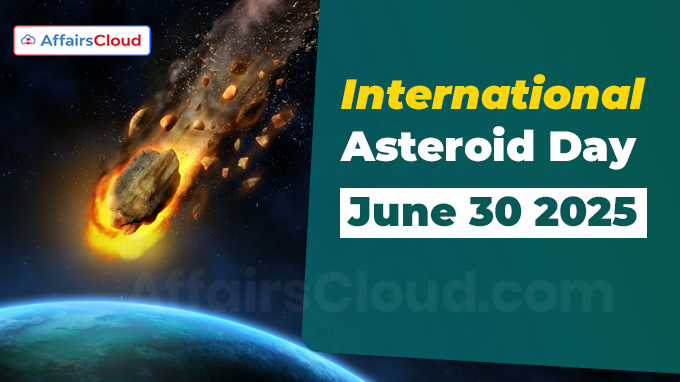 The United Nations (UN) observes International Asteroid Day(IAD) every year on 30th June to raise global awareness about asteroids, Near-Earth objects (NEOs), and the need for planetary defense.
The United Nations (UN) observes International Asteroid Day(IAD) every year on 30th June to raise global awareness about asteroids, Near-Earth objects (NEOs), and the need for planetary defense.
- This day reminds the world about Earth’s exposure to asteroid impacts and the importance of early detection and scientific measures to prevent potential hazards.
Background:
i.On 6th December 2016, the United Nations General Assembly (UNGA) officially declared International Asteroid Day (IAD) through Resolution A/71/492, to be observed every year on 30th June.
ii.The declaration was made following a proposal by the Association of Space Explorers, an international non-profit organisation of astronauts, and was endorsed by the Committee on the Peaceful Uses of Outer Space (COPUOS), which works to promote international cooperation in the peaceful exploration and use of outer space.
iii.IAD was officially observed for the first time on 30th June 2017.
Co Founders:
IAD was co-founded in 2014 by:
i.Dr. Brian May – Astrophysicist and lead guitarist of the British rock band Queen.
ii.Rusty Schweickart – Apollo 9 astronaut and advocate for planetary defense.
iii.Grigorij Richters – Filmmaker who created the Asteroid Day documentary 51 Degrees North.
iv.Danica Remy – President of Mill Valley (California, United States of America (USA)) based-B612 Foundation, a non-profit organisation focused on protecting Earth from asteroid impacts
Why June 30:
i.June 30 was chosen to observe IAD because it marks the anniversary of the Tunguska Event, which occurred on 30th June 1908 in Siberia, Russian Federation.
- During this event, a massive asteroid or meteoroid exploded in Earth’s atmosphere, flattening about 2,150 square kilometres(Sq Km) of forest.
ii.It remains the largest asteroid impact recorded in modern history and serves as a reminder of Earth’s vulnerability to asteroid impacts, highlighting the importance of global awareness, early detection, and planetary defense.
International Year 2029:
In December 2024, the United Nations General Assembly (UNGA) declared 2029 as the International Year of Asteroid Awareness and Planetary Defence to coincide with the close approach of asteroid 99942 Apophis, which will pass within 32,000 km of Earth on 13th April 2029.
- This rare flyby aims to increase global awareness about Near-Earth Objects (NEOs) and support dedicated missions such as the Rapid Apophis Mission for Space Safety (RAMSES) planned by the European Space Agency (ESA).
About Near-Earth Objects (NEOs):
i.NEOs are asteroids and comets that have orbits bringing them within 1.3 astronomical units (AU) approximately 194 million km from Earth’s orbit around the Sun.
ii.NEOs are categorised mainly into:
- Near-Earth Asteroids (NEAs) – Small rocky bodies that orbit close to Earth.
- Near-Earth Comets (NECs) – Icy celestial objects with orbits that bring them near Earth occasionally.
iii.NEOs are closely monitored because they pose a potential collision threat to Earth. Historical examples like the Tunguska Event (1908) and the Chelyabinsk Meteor (2013) highlight the importance of early detection and global preparedness.
Global Response:
i.The United Nations Office for Outer Space Affairs (UNOOSA) is the UN body responsible for promoting international cooperation in the peaceful use and exploration of outer space.
ii.UNOOSA works closely with the Committee on the Peaceful Uses of Outer Space (COPUOS) and supports global initiatives like the International Asteroid Warning Network (IAWN) and the Space Mission Planning Advisory Group (SMPAG).
iii.UN , through the COPUOS, oversees international collaboration to promote peaceful uses of outer space, including protection from asteroid impacts.
iv.Key global mechanisms include:
- IAWN: A global network that shares information, observations, and alerts about hazardous NEOs to ensure timely warnings.
- SMPAG: A forum of space agencies and experts that develops joint plans for deflecting or mitigating the impact threat of hazardous asteroids.
2025 Event:
i.Luxembourg-based Asteroid Foundation will celebrate the 10th anniversary of Asteroid Day from 26th to 28th June 2025, with public programmes in Luxembourg, including space lectures, festivals, and art-science performances at Cercle Cité.
ii.These events were open to the public and live-streamed globally to promote asteroid awareness and planetary defense.
About United Nations Office for Outer Space Affairs (UNOOSA):
Director – Aarti Holla-Maini
Headquarters – Vienna, Austria
Established – 1958




